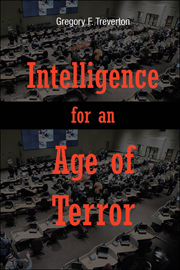Book contents
- Frontmatter
- Contents
- Preface
- Acronyms
- Intelligence for an Age of Terror
- 1 Introduction
- 2 The Changed Target
- 3 The Cold War Legacy
- 4 The Imperative of Change
- 5 The Agenda Ahead
- 6 The Special Challenge of Analysis
- 7 Many Customers, Too Many Secrets
- 8 Covert Action: Forward to the Past?
- 9 Rebuilding the Social Contract
- Notes
- Index
8 - Covert Action: Forward to the Past?
Published online by Cambridge University Press: 05 August 2012
- Frontmatter
- Contents
- Preface
- Acronyms
- Intelligence for an Age of Terror
- 1 Introduction
- 2 The Changed Target
- 3 The Cold War Legacy
- 4 The Imperative of Change
- 5 The Agenda Ahead
- 6 The Special Challenge of Analysis
- 7 Many Customers, Too Many Secrets
- 8 Covert Action: Forward to the Past?
- 9 Rebuilding the Social Contract
- Notes
- Index
Summary
Intelligence, like all professions, has its own vocabulary. For most of us, covert and clandestine are synonyms meaning “secret.” Not so for intelligence. There, clandestine does, indeed, mean secret. CIA spymasters are the clandestine service; their relationship to the spies they recruit is meant to remain secret. (A former father-in-law of mine, a CIA veteran, relished pronouncing clandestine as “candle-stine,” perhaps in ironic reference to what was not.) By contrast, for intelligence operations, covert means “unacknowledged” or “deniable”; it is defined in the law as “intended that the role of the United States Government will not be apparent or acknowledged publicly.”
My introduction to covert action was a fascinating one, moving as a not-yet-minted, then freshly minted Ph.D. to Washington for the first time to work for the original Senate Select Committee on Intelligence – often called the “Church Committee” after its chair, Senator Frank Church (D-ID). The investigations, hard on the heels of Watergate and allegations of covert U.S. intervention in Chile, were the nation's first-ever look behind the green curtain of intelligence. I had written about presidential decision making and so expected to work on the role of intelligence analysis in those decisions.
In fact, I spent virtually all of my time on covert action – and much of that on Chile. That stint in Washington was exhilarating and frustrating, and it produced one of few “aha” moments I have had researching in deeply classified documents.
- Type
- Chapter
- Information
- Intelligence for an Age of Terror , pp. 207 - 234Publisher: Cambridge University PressPrint publication year: 2009



